Stay in the know on all smart updates of your favorite topics.
People get more connected and technology becomes part of our daily life. Between 2014 and 2015 there was a 27% growth of internet traffic in Amsterdam. Eleven out of fifteen Trans-Atlantic data cables are connected with or go through Amsterdam and the AMS-IX is the second largest internet exchange point in the world. In 2016 Amsterdam was ranked second in the European Digital City Index. Do you work on a smarter city? Share your technologies here!
Top 3 Integrative Technologies To Disrupt The Smart City Space In 2019
We are living in an era that is witnessing the traditional cities turning into ‘smart cities’ with the technology penetrating at abnormal speeds. As we are moving closer to the beginning of a new year, there is a bubbling curiosity in the air about the technologies that will push the current advancements to further progress – continuing the transformative change.
In 2018, the tech world in the smart cities observed the development and gradual penetration of technologies like IoT, AI, Cloud computing, and of course Blockchain. Now, in 2019 the same technologies will surface as integrative technologies. They are set to play a more powerful role aiming at disrupting the marketplace while remodelling the consumer tech reality.
We look into the top 3 breakthroughs and hope that these will not just bring the latest state-of-the-art infrastructure in smart cities but also make them more secure, sustainable, and happening places to live in.
Innovations of Amsterdam 2018 - SensorTeam
A Dutch delegation is ready to meet you at the Smart City Expo in Barcelona next week. SensorTeam is one of the participating companies and will show their new IoT sensor services. Their network of sound sensors helps residents to measure noise in their neighbourhoods. Are you ready to see real time sound measurements at the Expo?
Meet SensorTeam at the Dutch Pavilion!
Smart City Expo World Congress Barcelona,
12-15 November 2018
Gran Via, hall 2, Street D, Stand 479
Want to watch more video's?
Click on the tag Smart City Expo 2018 below, or on this link: https://amsterdamsmartcity.com/posts?tags=smart-city-expo-2018
Smart city technology: a case for digital social innovation
Smart city exhibitions like those in Barcelona, Las Vegas and Dubai are attracting more and more companies that are trying to sell their technology to eager city councils that want to make their city smart.
In my most recent blogpost, I describe how smart city technology seems to be becoming more important than the ultimate goal, a sustainable, humane and liveable city. Opposition is growing, among others from the digital social innovation movement in which De Waag plays an important role in Amsterdam.
This blogpost is also available in Dutch
Smart city. Broedplaats voor digitale sociale innovatie in plaats van afzetmarkt voor technologiebedrijven https://wp.me/p32hqY-1Hc
We wrote a book about the Governance of the Smart City (in Dutch)
But we will tell about it in English at the Smart City Expo in Barcelona. The book is about ethics and policy. A lot is possible using data, but how much is wished for? How much should be in the hands of the Googles of the world? Where do we draw the line? What is already stated in the law? You can order the book online at our website or ask us about it at the Holland Paviljoen in Barcelona.
Sharing data in a Digital Society!
The prisoner’s dilemma has been applied to many decision and cooperation problems over the years, but not yet to the concept of data-sharing in a B2B context. A shame, since insights in the prisoner’s dilemma can teach us a lot about why we do not share our data, and how we can start remedying that. In this think piece, we examine a modified version of the prisoner’s dilemma called the ‘data sharing dilemma’.
Innovations from Amsterdam 2018 - AMS-IX
A Dutch delegation is ready to meet you at the Smart City in Barcelona. The first internet exchange in the world, the Amsterdam Internet Exchange will be there too.
Peter, CEO from AMS-IX is looking for inspiring ideas and likes to build a network.
Share your knowledge with Peter at the Holland Pavilion!
Smart City Expo World Congress Barcelona
13-15 November 2018
Gran Via, hall 2, Street D, Stand 479
#SCEWC18
Want to watch more video's?
Click on the tag Smart City Expo 2018 below, or on this link: https://amsterdamsmartcity.com/posts?tags=smart-city-expo-2018
Uitnodiging voor het programma: Tech for Good - over de strijd voor een vrij internet
Wij van Pakhuis de Zwijger nodigen de community van Amsterdam Smart City graag uit voor het programma van 26 oktober om 20:00, genaamd Tech for Good. Technologische veranderingen gaan snel. Zo snel, dat zowel overheden als burgers de controle dreigen te verliezen. We staan als samenleving op een kruispunt: willen we toestaan dat technologie onze samenleving beheerst, of willen we dat de samenleving de technologie in handen heeft? In gesprek met Marietje Schaake, Melanie Rieback en Giulietta Marani over de strijd voor een vrij internet.
Amsterdam Smart City sluit aan bij het publiek dat er deze avond zal zijn, en uw organisatie heeft wellicht ook interesse in de verschillende perspectieven die deze avond aan bod komen.
Als u nog verdere vragen heeft, beantwoorden wij deze graag.
Met vriendelijke groet,
Daniel Burgers
Stagiair programmamaker Economie, Democratie en Onderwijs
Pakhuis de Zwijger, Piet Heinkade 181 K, 1019 HC Amsterdam
T +31 (0)20 6 246 380 |
daniel@dezwijger.nl | www.dezwijger.nl | www.stedenintransitie.nl
The Growing Importance Of Data In Smart Cities
In the recent years, data has actually become the life-giving force of the developing innovations in smart cities around the world. Over the last 20 years, it has had a phenomenal impact on different industries including transport, retail, and utility. A lot of cities are taking data benefits to gain a better insight into city operations. A number of them have opened their data to promote transparency and to encourage innovators to create new services leveraging the data. Using data benefits, many brands in smart cities are now looking to implement digital innovations that can facilitate both the employees as well as customers.
The advanced cities are now going a step ahead by widening the scope of data. They are coming up with groundbreaking initiatives that are not just confined to their own cities but endeavouring to share benefits beyond the boundaries. Let us read on to know which influential brands in these smart cities are taking this step.
A conversation with Jamie Susskind on the tech revolution and the future of politics
Martin Stewart. Weeks. twittered this interesting read. It is an apt rendition of the thesis that, unless the #DigitalTransformation project has something useful to say or add to these political, structural, institutional questions, it won’t be worth much.
A Smart City Government Has A Rather Bigger Role To Play
History proves that cities have always been the centre of civilization. Be it social or economic, the innovation and the developments taking place in cities have always found its reverberations reaching other parts of the globe. Today, urbanisation is spreading around the world at a tremendous rate. More than half of the global population lives in cities and the number is still counting. A developed city like London has seen a population rise from 1 to 8.5 million in 140 years while even developing cities like Mumbai, Lagos, Sao Paulo, and Istanbul have seen a minimum 200,000 people flowing in each year in the recent decades. Lagos has witnessed a staggering 600,000 people moving in per year with a rate of 70 people per hour.
We Proudly Present Our Partners: Part #9 Waag
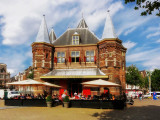
In June we kicked off a new phase of Amsterdam Smart City. More partners than ever are pooling their networks, knowledge and skills. Who are they? We will present some of them one by one. Waag: 'Amsterdam should be an innovative frontrunner with a focus on the ethical and principled development of smart city technology.'
What is the main reason for you to join the open collective Amsterdam Smart City?
Waag joined the Amsterdam Smart City collective because we believe that inclusive and open innovation only can happen with cooperation between all stakeholders involved, with an important role reserved for the citizen. Waag represents a critical, but constructive voice in the development of a smart and shared Amsterdam.
What is your ambition for the city and the Amsterdam Metropolitan Area?
Waag wants Amsterdam to be an innovative frontrunner with a special focus on ethical and principled development of new smart city technology. Innovative technology should serve the citizens of Amsterdam. According to the "Amsterdam Approach”, we want to create educated, involved and empowered citizens and involve these citizens in the development of smart city solutions.
What do you think is the biggest challenge for the city and the region in the future?
Waag wants to give back control to the citizens, and give them the tools to manage their environment, personal data and privacy in the development of city of the future.
How do you see the role of the residents and citizens in your plans?
The residents of Amsterdam play an pivotal and essential role in our approach to innovation. Through co-creation, we invite citizens to give input, create, and lend their expertise for the development of open, fair and inclusive technology.
What do you hope to work on in the upcoming years?
In the context of the Smart City Waag is active with several projects on a broad spectrum of topics, such as personal data ownership (DECODE), citizen science (Amsterdam Smart Citizen Lab), maker education (Maakplaats 021), commons (Chamber of Commons), and much more.
Schiphol to Expand Predictability Technology to Make Passenger Journeys more Seamless
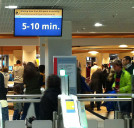
Amsterdam Airport Schiphol´s investment in the Veovo BlipTrack Guest Predictability solution has resulted in some significant and positive changes to the way Schiphol understands passenger movement and has led to considerable experiential improvements.
At Amsterdam Schiphol Airport, which serves as a transit hub for over 300 destinations, passenger numbers have skyrocketed from 50 million in 2011, to almost 70 million in 2017. Playing host to 107 airlines, and with six runways, 90 gates, heavily used road infrastructure and capacity constraints, Schiphol’s passenger management challenges are considerable.
> Multiple challenges, one holistic solution
The airport continually needs to accommodate these rapidly increasing passenger volumes, avoid safety breaches, comply with changing regulations, keep staff happy, expand capacity and ensure that passengers enjoy a pleasant airport experience.
Insight and collaboration are essential to resolve and prevent these ongoing challenges, to which Schiphol relies on data gathered by the Veovo BlipTrack Guest Predictability solution. Its combination of sensors and data-processing analytics software provides real-time passenger movement information, to proactively manage and improve the flow.
Initially, the solution was implemented to provide automatic queue wait time measurements at security processes. With this data on hand, the airport found it was able to quickly and efficiently resolve issues arising from irregularities and disruptions. It also helps them monitor queues, ensuring they stay within their service level agreements.
“At passenger processes, airports must constantly be prepared to respond to increasing passenger numbers and demands. At Schiphol, which constantly battles challenges with capacity, the BlipTrack solution offers a necessary level of service and logistical insights,” says Michiel de Haas, Capacity Manager at Amsterdam Airport Schiphol.
> The solution that keeps on growing
Since inception, new functionalities have gradually been added, including predicted wait time information, displayed on screens at passenger processing points.
“What travellers want, is to move through all the multiple processing areas as fast as possible, so that they can relax without the pressure of potentially missed flights. Keeping passengers in the loop by providing them with estimated wait times, helps reduce stress levels by creating realistic expectations,” explains Christian Bugislaus Carstens, Marketing Manager at Veovo.
Recently developed hybrid camera/WiFi technology helps the airport to alleviate overcrowding, while passenger flow measurement provides a seamless picture of passenger movement and behaviour throughout the airport. With this information, the airport gains an understanding of how disruptions affect behaviour to improve contingency planning. It also helps the airport add value to existing facilities and make investments that unlock new business opportunities.
“The Veovo BlipTrack solution has helped us manage airport performance with data-driven certainty. With advance predictions of expected passengers and real-time visibility of passenger flow, we can keep security processing quick, and also make holistic decisions on how to create more efficient and more meaningful customer experiences. It has proven very valuable, as it provides continuous, airport-wide visibility and measurements - a feature that other systems do not provide, as they are not able to measure flow for longer periods or through multiple stages of the journey,” explains Eric van´t Veer, Project Manager at Schiphol Group.
> A part of Schiphol´s digital transformation
The cooperation has grown considerably over the years, resulting in continuously improved solutions for both the airport and Veovo. Today, the partnership plays an important part in Schiphol´s predictive approach and digital transformation initiative.
“We are working on the development of a data-driven and proactive approach towards performance management. Having accurate data available on a variety of processes is key. Therefore, we see developments towards a wider network of different sensors and combining information collected by a variety of systems. We want to work towards connecting the different processes we measure today into one single travel pattern,” ends Eric van´t Veer.
“Leveraging the immense amount of data collected by BlipTrack and other data sources enables Schiphol to learn from the past and help predict the future to make informed decisions. It also helps the airport to create a safe and secure environment, unique sense of place, and personalised experiences for everyone – staff, passengers and visitors alike,” says Peter Knudsen, General Manager at Veovo, BlipTrack Guest Predictability.
Today, the solution covers all terminal entrances to the lounges. By the end of 2018, it will include the complete passenger journey from airport entrances to gates, and from gates to airport exits.
We Proudly Present Our Partners: Part #7 Municipality of Amstelveen
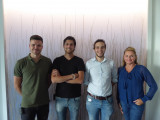
In June we kicked off a new phase of Amsterdam Smart City. Amsterdam Smart City is a collective of citizens, businesses, knowledge institutions and public authorities that are convinced that the changes necessary for the city and region, can only be achieved through collaboration.
More partners than ever are pooling their networks, knowledge and skills. Who are they? We will present some of them one by one. City of Amstelveen: 'Work collectively to improve the quality of life!'
What is the main reason for you to join the open collective Amsterdam Smart City?
We believe in cooperation, and we think this is a great opportunity to bring together our knowledge and expertise. We aim to solve challenges together with Amsterdam Smart City, and scale up successful Amsterdam Smart City projects.
What is your ambition for the city and the Amsterdam Metropolitan Area?
We are looking forward to work collectively to improve the quality of life in our cities and create a sustainable future for everyone!
What do you think is the biggest challenge for the city and the region in the future?
Creating a sustainable Metropolitan Area, that provides space for everyone to achieve his full potential.
How do you see the role of the residents and citizens in your plans?
Amstelveen Smart Society aims both to make our citizens smarter, and use the knowledge in our society (citizens, residents, entrepreneurs) to create the most fitting solutions.
What do you hope to work on in the upcoming years?
In Education: Programming and robotics in primary education
In Digitalising welfare in order to give children in low income families easy access to sporting clubs and cultural activities.
A pilot with Automated Vehicles for the first/last mile from Metro to destination
A fast broadband connection for every citizen in Amstelveen.
Picture: Stefan Cornelissen, Bill Kuipers, Guido Israels, Simone Doornbosch.
We Proudly Present Our Partners: Part #6 Eurofiber
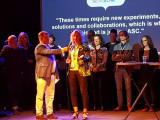
In June we kicked off a new phase of Amsterdam Smart City. Amsterdam Smart City is a collective of citizens, businesses, knowledge institutions and public authorities that are convinced that the changes necessary for the city and region, can only be achieved through collaboration.
More partners than ever are pooling their networks, knowledge and skills. Who are they? We will present some of them one by one. Eurofiber: 'We need a dialogue with citizens on how to use technology.'
What is the main reason for you to join the open collective Amsterdam Smart City?
As a supplier of high quality digital infrastructure, Eurofiber is closely connected to the Amsterdam region. Our fiber optic network offers connectivity for Amsterdam hospitals, schools, metro services, energy stations and the water net, but we are also the basis for smart city applications. Currently, 60 bridges and locks in the region are connected to the Eurofiber network, just as 200 bus stops and security cameras in public space
To us, Amsterdam Smart City is unique because of its broad perspective. Eurofiber believes that citizens, public authorities and businesses should work together to address social, environmental and economic challenges. An open, smart infrastructure provides the solid basis for a Smart Society and empowers Amsterdam to overcome these challenges. Eurofiber will contribute to the construction of this smart infrastructure. We look forward to work together with all the partners for the benefit of the Amsterdam region and its inhabitants.
What is your ambition for the city and the Amsterdam Metropolitan Area?
It is our ambition to come up with new, scalable initiatives that make our capital and region more ‘connected’ but also more sustainable. Eurofiber and the other ASC partners want to make this place a better place to live in. We want to help Amsterdam in becoming a smart city example for The Netherlands, Europe and the world. Not only from a technical point of view, but especially from the perspective of its residents and visitors.
What do you think is the biggest challenge for the city and the region in the future?
Becoming a smart city where life is good for all. There are many challenges, starting with the engagement of all stakeholders in order to develop a really holistic approach. The possibilities with the Internet of Things (IoT) are endless and we expect to have a billion connections on one square kilometre soon. To control this, we need directions, standards and boundaries. But we also need the dialogue with the residents of the region.
How do you see the role of the residents and citizens in your plans?
Residents should be in the center of all smart city developments. We need a dialogue with citizens how to use this technology for the topics we find important. The needs of citizens in the city and region are leading. Therefore Amsterdam Smart City is a great initiative, because the society is the basis. All other parties involved should have the wellbeing of the inhabitants as their number one priority.
Image: Hilda Koenes, Marketing Director Eurofiber.
Apply now for the Startup in Residence Amsterdam Metropolitan Area programme

Startup in Residence Amsterdam is going regional!
For the first time nine municipalities join forces to connect startups, scale-ups, innovative SMB’s and social enterprises with key social and urban challenges in the Amsterdam Metropolitan Area.
This regional program is a collaboration across the following municipalities: Haarlem, Haar-lemmermeer, Velsen, Diemen, Lelystad, Almere, Purmerend, Zaanstad and Amsterdam. Together they defined 7 challenges. These range from ‘how do we decrease loneliness’ to ‘how do we counter building subsidence’. The complete list of challenges is available at startupinresidence.com/ama.
Are you a startup, scale-up, innovative SME or social enterprise and are you working on social and urban challenges in the Amsterdam Metropolitan Area?
Come and join our programme, applications open from August 14 until October 14 2018 23:59!
Startup in Residence Programme
The programme invites both Dutch and international entrepreneurs to social and urban chal-lenges in collaboration with the local government. Their innovative solutions impact the region as well as its citizens. The Amsterdam Metropolitan Area can significantly benefit the prospects of a startup, scale-up, innovative SMB or social enterprise ,by investing and/or becoming a launching customer or partner. We bring together a network of committed entrepreneurs, mentors, civil servants and partners which benefits both the Amsterdam Metropolitan Area and you.
More Info
There will be an information meeting on 20th September for all startups and scale ups that are interested. Here, they will have the opportunity to ask questions about the challenges, the incubator programme and the (registration) process.
For more information please visit the website (https://startupinresidence.com/ama/) or send us an e-mail. (sir.ama@amsterdam.nl)
Het Manifest ‘Tada – duidelijk over data’: 6 toepassingen in de praktijk
De Board ontwikkelde samen met vele professionals uit de regio het manifest ‘Tada – duidelijk over data’. Het Manifest beschrijft zes pijlers die een leidraad kunnen zijn voor verantwoord datagebruik. Maar hoe kunnen we de waarden uit het manifest toepassen in de praktijk? In zes afleveringen laten we verschillende cases zien van organisaties uit de regio en hoe zij verantwoord omgaan met onze data.
Tada in de praktijk (4): Legitiem en gecontroleerd

Het manifest ‘Tada – duidelijk over data’ biedt steden en regio’s handvatten om op een verantwoorde manier om te gaan met digitalisering. In een serie interviews gaan we in op hoe we de waarden uit het manifest kunnen toepassen in de praktijk.
Hoe kunnen we de waarden uit het manifest toepassen in de praktijk? In de vierde aflevering van een serie legt Tom Demeyer, CTO bij Waag Society, uit hoe het Europese project DECODE invulling geeft aan de waarde ‘legitiem en gecontroleerd’.
De waarde legitiem en gecontroleerd staat in het manifest om bewoners en gebruikers zeggenschap over de vormgeving van hun digitale stad te geven. De overheid, maatschappelijke organisaties en bedrijven faciliteren dit. Zij monitoren de ontwikkeling en de maatschappelijke gevolgen.
Decentrale digitale infrastructuur
Het DECODE-project wil deze waarde in de praktijk brengen door een decentrale digitale infrastructuur te ontwerpen die het mogelijk maakt je eigen data en identiteit te managen. Als het aan de onderzoekers ligt heeft iedereen straks een goed beveiligde app op zijn telefoon waarmee je toegang tot en gebruik van je data kunt regelen.
Tom Demeyer (CTO bij Waag Society) heeft meegeschreven aan de white paper voor dit Europese onderzoeksproject en houdt zich vooral bezig met de totstandkoming van de architectuur ervoor. "We hebben nauwelijks zeggenschap over onze digitale identiteit, terwijl 90 procent van onze interactie met de maatschappij tegenwoordig digitaal is", zo verklaart hij het initiatief. "Het probleem is dat die digitale identiteit wordt vormgegeven door bedrijven als Facebook, de systemen van de overheid en de systemen op je werk. Je bent eigenlijk een avatar van je digitale zelf en je hebt daar geen invloed op."

Grootste uitdagingen
DECODE gaat niet alleen over data-privacy, maar ook over het zelf kunnen beslissen met wie we onze data delen. Het project loopt ruimt een jaar en in Amsterdam is net een eerste pilot gestart. In oktober moeten alle pilots lopen en dan is er 1,5 jaar om te testen. Demeyer: "We richten alles zo in dat er, ook als de subsidie straks ophoudt, iets staat de gebruikers van de toepassingen zelf in stand kunnen houden."
De techniek is niet de grootste uitdaging. "Die is weliswaar supercomplex, maar lijkt uitvoerbaar, doordat we met hele goede mensen werken. De grootste uitdaging is mensen en dienstverleners te overtuigen dat ze dit moeten gaan gebruiken en bedrijven en instanties overtuigen dat ze data kunnen gebruiken zonder het te verzamelen."
Lees het hele interview met Tom Demeyer op de site van de Amsterdam Economic Board
Andere blogs over Tada vindt je op de projectpagina: <https://amsterdamsmartcity.com/projects/tada-data-disclosed>
We Proudly Present Our Partners: Part #1 Johan Cruijff ArenA
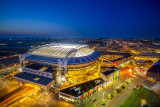
On the 21st of June we kicked off a new phase of Amsterdam Smart City. Amsterdam Smart City is an open collective of citizens, businesses, knowledge institutions and public authorities that are convinced that the changes necessary for the city and region, can only be achieved through collaboration.
More partners than ever are pooling their networks, knowledge and skills. Who are they? We will present some of them one by one. First one to kick off: Johan Cruijff ArenA: ‘We need a good plan and a holistic, but also practical approach of what a Smart City should be like.’
What is your main reason to join the open collective Amsterdam Smart City?
Sustainability and innovation are main topics for us and are part of our strategy. We are very aware that innovation takes place with each other, especially in the new world we live in. The open collective of Amsterdam Smart City is a good way to shape and maintain partnerships.
What is your ambition for the city and the Amsterdam Metropolitan Area?
We have the ambition to transform the Zuid-Oost Area and the Johan Cruijff ArenA into a Smart City where we create value for the city and the planet. Creating this public value is very important for us.
What do you think is the biggest challenge for the city and the region in the future?
The biggest challenge to succeed is to have involvement of all stakeholders that play an important role such as partners, inhabitants and the City of Amsterdam. All participating stakeholders should be committed to the vision and ambition and be part of the change. We need decisiveness, a good plan and an integral holistic but also a practical approach of what a Smart City should be like.
> We are a proud partner of Amsterdam Smart City because we believe it is important to innovate together to create a sustainable and livable city
How do you see the role of the residents and citizens in your plans?
We make the city for the citizens, not for the government. To do that properly, it is a must to involve citizens in the developments, invite them to join and to create shared ownership.
What do you hope to work on in the upcoming years?
This year we have or will realize milestones such as the ArenA battery and 5G-testing as part of our ArenA field lab. We will follow this up with projects regarding social inclusion, mobility and fan experience. A major milestone is the EK2020. In 2020 we aim to be the most innovative stadium and the first results of the smart city will be showed. I hope that in 1 to 5 years we will be the reference case of a smart and liveable city for the city, the Metropolitan area and the rest of the world.
> Let’s create better streets, neighbourhoods and cities!
Deutsche Telekom challenges innovators to come up with digital services that make smart cities more livable for everyone!
Do you have an idea for how digital technologies and sensor data can make cities more livable for their citizens, especially those that are most disadvantaged?
Deutsche Telekom will allocate $25,000USD among three innovative solutions and invite the winners to present at the Deutsche Telekom’s annual Innovation Day forum in September!
Find out more and submit your idea by 13 August!
Stay up to date
Get notified about new updates, opportunities or events that match your interests.

